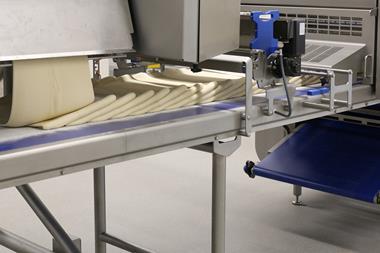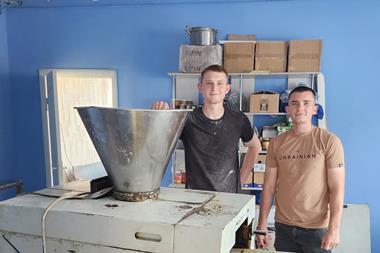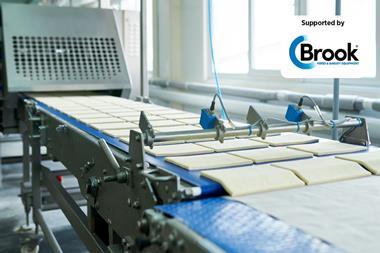Mobile phones, cars, computers – there are plenty of things we change every few years to keep up with the latest technology or trends. But it’s not an attitude businesses can afford to take with their bakery plant
Future-proofing equipment is essential but not necessarily easy, given how quickly consumer and customer demands shift.
“A major challenge when planning a bakery is trying to build in some flexibility for dealing with largely unknown new product developments,” says Stan Cauvain of baking industry consultants Baketran.
He adds that plant longevity is primarily determined by the prover, oven and cooler – with the oven probably the most critical, because its size and performance dictate the capacity of the plant.
“While there is much talk about flexible production, the oven often remains a constraining factor, since many product changes of varying shapes and sizes significantly reduce efficiency and increase production costs,” explains Cauvain. “Choices of pan and tray design to deliver a range of different products in relation to prover and oven design are key considerations when it comes to future-proof planning.”
Baker Perkins suggests that any bakery purchasing equipment to make 800g loaves should ensure it could also produce, for example, 600g or 1,000g loaves in case requirements change.
Kit also needs to be adaptable for different recipes, such as gluten-free and heavily seeded doughs.
Handtmann, for example, says it supplies portioning and dividing equipment that is particularly good at handling gluten-free dough, which can be particularly sticky.
“As with traditional bread dough, friction can have a detrimental effect on product quality,” says Andy Turner, product manager at Handtmann. “However the design of the Handtmann hopper, vane cells and the short product path reduce this friction and prevent issues with product quality.”
Chris Huish, director of UK independent sales at Mono Equipment, advises businesses ensure their plants can cope with British-style products. “Many machines from overseas cannot cope with British doughs and products, and breakdowns will occur if the wrong equipment is supplied in the first place,” he says.
Buying the best possible equipment, maintaining it to the highest possible standard, and upgrading to new technology whenever possible can help ensure longevity, suggests Keith Graham, business development manager at Baker Perkins.
This attitude can keep certain pieces of kit – ovens and heavy plant, for example – functioning well for many decades. But a business will only want to keep kit in top condition if it bought the right equipment.
“The biggest mistake is not purchasing the correct equipment required to produce the products in the first place,” says Huish at Mono. “Businesses need to research if the plants can produce the correct weight range and consistent moulding each and every time.”
He advises that being able to programme a number of recipes into a machine will help ensure product consistency.
Graham at Baker Perkins says the most common mistake businesses make is buying the equipment with the lowest price. He adds that low-cost machines may appear to meet the required specification, but reliability can quickly deteriorate.
He also warns that installing equipment lacking the latest control systems and hygienic design – including use of the latest hygienic materials – is a recipe for short life. (Also see ‘Coming clean’ box-out above.)
“While it might be initially cheaper to purchase cheap or obsolescent equipment, the chances are it will have to be replaced sooner rather than later. Combined with poor performance, the result is an overall higher lifetime cost,” says Graham.
Cauvain at Baketran warns that businesses must also be careful not to misjudge the overall capacity of the plant and available production space.
“Judging the future capacity of a plant is difficult enough, but if the plant layout is such that the opportunities to bring in extra capacity or alternative processing arrangements are restricted, the life of a plant can be severely limited,” he explains.
Another mistake bakeries can make is buying equipment without having the trade to support it. “This industry is littered with the graveyards of bakery equipment,” says bakery consultant Brian Clarke, director of European Food Consultants.
He warns that it is risky to assume you will still have the business in two years’ time when producing own-label goods for a major supermarket, for example.
“Business is switched on an annual basis, so ensure you have 60% produced for your own brand and under your control when investing,” Clarke recommends. “Or have multiple customers taking from the plant.”
Even the most suitable equipment will eventually develop issues – whether lack of capacity, outdated elements or the effect of wear and tear.
Campden BRI points out that potential warnings with equipment include: a high percentage of under- or over-weight items frequent plant stoppages for breakdownsreplacement parts are no longer available due to the age of the plant energy usage is steadily increasing and efficiencies reducing.
“Bakers should talk to potential suppliers to gauge attitudes to service generally – and especially upgrades and remodelling,” says Graham at Baker Perkins, adding that his company offers a lifetime programme covering parts, service, upgrades and rebuilds for machines for as long as they remain in production.
“Baker Perkins continuously develops equipment to improve performance and reduce cost of ownership. These are usually available as upgrades for existing machinery; they address problems such as capacity, poor reliability and outdated hygiene standards,” he adds.
Huish at Mono says one of the most crucial stages in any new business venture is the initial knowledge and data-gathering process. “Using experts in the field not only provides a professional source of knowledge and expertise, but also bestows a peace of mind that is surely priceless,” he explains.
His company provides an end-to-end service from initial consultation, equipment specification, planning and design through to installation, commissioning and after-sales service.
“Our vast knowledge of the bake-off and scratch bakery markets, together with extensive project management capabilities, has enabled us to develop bespoke baking concepts for clients ranging from owner-managed artisan bakeries to large networks of in-store bakeries,” adds Huish.
Handtmann, meanwhile, has opened a technical training facility for UK bakery producers to develop products at its recently built customer centre in Germany.
Another way of ensuring the most suitable plant is acquired for the long term is the use of a third-party advisor.
“Designing a new plant represents a significant opportunity to deal with the traditional bottlenecks,” says Cauvain at Baketran. “It is always useful to have an external viewpoint on plant design, engineering and layout.
“However, they should always be integrated with an in-depth consideration of the baking technology required and there are advantages to taking the opportunity of involving a ‘neutral’ third-party view.”
Using a consultant or specialist is advised by Michal Rozkydalek, international projects manager at Czech Republic-based J4, who explains: “The operational costs are usually much higher than the initial investment.”
He adds that labour costs, maintenance, fuel consumption and waste reduction are all factors that should be key considerations from the early planning stages.
Which suggests that, when a business is considering a major investment in bakery plant, it can never have too many eyes looking to the future.
Coming clean: Equipment hygiene
Hygiene is one word on the lips of almost everyone supplying plant equipment.
Beyond long-established food safety factors, growing consumer concern over allergens and interest in specialist diets have tightened the focus on cross-contamination.
“Allergen-free is a trend that presents challenges if bakeries want to manufacture conventional wheat-based products using the same equipment,” says Campden BRI. “To reduce the risk of cross-contamination from product changeovers all contact surfaces need to be easy to clean.”
Additionally, design should help keep equipment down-time to a minimum.
“Hygienic design is fundamental,” says Keith Graham, business development manager at Baker Perkins. A recent Baker Perkins development is the Accurist 2.1 washdown divider (pictured) in which all mechanisms between the frames are made from stainless materials. It also features sealed-for-life bearings, which enable all areas where oil and product debris may collect to be cleaned with chemical foam-and-rinse hosedown.
High hygiene standards and ease of maintenance are a priority for Koenig, which points out that its Industrie AW automatic roll plant has its drives separated from the dough area, while large doors make access for cleaning easy.
The main components of its medium-capacity Rex Futura Multi, including the dough feeding rollers, flour duster, dividing star wheels and drum cleaning brush, can be easily removed to allow unrestricted access to the areas where dough and flour are found.
And, of course, good hygiene also plays a big role in the longevity of plant.
“We have seen many machines that haven’t lasted as long as they should do due to poor maintenance procedures being carried out,” says Chris Huish, director of UK independent sales at Mono Equipment.
Case Study: Sperrin Bakery, Draperstown, Northern Ireland
Northern Ireland’s Sperrin Bakery opted to invest in an automatic roll plant after its ageing divider moulder could no longer keep up with demand for its baps.
The 35-year-old wholesale craft bakery, which supplies bread, cakes and pastries to a growing number of outlets, including around 110 shops, decided to go with a Koenig Mini-Rex, supplied by EPP. With a capacity of 1,800 to 4,000 dough pieces per hour in a weight range of 25g to 140g, the Mini-Rex is designed for one-person operation.
“We were impressed by its gentle dividing and rounding action, and its hygienic design, which means it is so easy to keep clean,” says Sperrin Bakery managing director Eddie Burke, adding that no tools are required when general maintenance tasks need to be carried out.
“We also like the way it can handle soft and firm doughs including white, fruited, doughnut, brioche and pizza. To bakeries like ours, the options seem endless.”
The Mini-Rex features up to 50 programmes in the control memory, with scaling weight, required capacity and rounding functions all controlled by a Siemens touchscreen panel, which also stores the setting for all the bakers’ products, explains EPP managing director Steve Merritt.
Case Study: Process changes
Stan Cauvain of consultancy Baketran on how process can play a big role in plant capacity
“A client was struggling to meet bread production targets because of limited baking capacity (about 20% short). The initial reaction was to consider purchasing new ovens, even though this would have had a potentially negative impact on the space available for other bakery operations.
“A review of the plant and production processes showed the ovens were, in fact, being under-utilised because of the technology employed at the front-end for dough-making.
“Changes were made to dough mixing and dough processing was simplified, which resulted in a better match between initial production and baking capacities. This increased oven utilisation and enabled production targets to be more readily achieved without the need to purchase additional baking capacity.”
Technology set to shape future of plant
We asked baking industry experts how technological developments are helping to future-proof plant:
Chris Huish, sale director, Mono Equipment
With energy prices predicted to rise, energy efficiency will continue to be a fundamental and critically important element in the design of bakery equipment. The requirement for interconnectivity and communication between pieces of equipment is likely to become the norm, along with remote access for real-time monitoring and improved diagnostics. Another key requirement will be the need to respond to the continued demand for labour-saving devices with intuitive user interfaces, which remove the opportunity for human error.
Laura Sherwood, bakery technologist, Campden BRI
Advances in sensor technology and computing power are driving greater automation in processing.
Brian Clarke, director, European Food Consultants
The more mundane roles in tin handling are already completed by robotics and mechanical handling in larger-scale operations, while dispatching is completed by mechanical handling and, in some cases, robotics and computer-controlled programs.
Looking forward, I see greater use of robotics and software. Optimisation of plant and process will continue, with a downward pressure on price. In the larger-scale operations, I see potential contraction of sites, but increased expenditure on efficiency and upscaling. I see segmentation of this sector, so flexibility is key. The craft sector will continue to grow.
Keith Graham, business development manager, Baker Perkins
Hygienic design is fundamental. The easier equipment is to clean and maintain, the longer it will remain viable.
Stan Cauvain, Baketran
With more relevant information on the technical requirements for dough production and processing, it is becoming possible to improve the flexibility of plant design and operation, which will help with future-proofing.
Industrial innovation recognised by IBA awards
Six examples of innovative industrial and line-oriented production equipment were presented with awards at the IBA trade show last October.
The winners were chosen by a judging panel including: Michael Kleinert (Zurich University of Applied Sciences, Wädenswil); Dr Thomas Becker (Technical University Munich, Scientific Center Weihenstephan); Norbert Lötz (production manager at Harry Bread); and Stefan Schütter and Dirk Waclawek (of awards founder Backtechnik Europe).
The six winners were:
Smart Services
Supplier: Fritsch
Digitalisation and Industry 4.0 – the development of systems for data-sharing and automation – are of growing interest to the baking industry. Fritsch says it has taken this into account with its Smart Services that, in addition to standard functions such as real-time condition monitoring and cloud-based operating data, use data glasses to make maintenance speedier and simpler. This enables bakery staff to send pictures and videos of affected system components to the manufacturer and speed up fault analysis.
Multi-functional ribbon punching station
Supplier: Koenig
This multi-functional belt stamping unit is part of Koenig’s recently introduced high-performance KGV-Plus line. It features gentle stamping for decorations, cutting, embossing and forming of dough pieces such as doughnuts, bagels, choux pastry rings, cinnamon rings and biscuits. It has a maximum capacity of 80 strokes a minute, corresponding to an output of 57,600 pieces per hour with 12-row operation.
M-TA oven
Supplier: Mecatherm
The M-TA tunnel oven (pictured above) features compact heating modules that work independently, and can combine radiant heat and convection. Mecatherm says this system, with a unique patented moveable base, doubles energy transfer methods at the bottom and top, in each area of the oven, offering a tailored baking curve. Its flexibility means the M-TA can bake an entire range of products using one piece of equipment.
Artisana
Supplier: Rondo
The Rondo Artisana line (pictured below) is designed for high-volume production of artisanal baked goods in many different sizes and shapes. Rondo says Artisana offers a range of innovations for gentle, accurate processing of highly hydrogenated or rested doughs. It adds that the most outstanding of these is the Rondobot industrial robot for gentle and customisable round moulding of sensitive dough pieces. Tool changes are fully automatic, using RFID coding.
Ionic Haze
Supplier: Wachtel
Wachtel has spent many years developing Ionic Haze, a process that uses ionisation to moisten dough. The process has now been perfected, according to the supplier, and will enable bakers to make energy savings and improve product quality.
Thermador TH Duplo
Supplier: Werner & Pfleiderer
The Thermador TH is a thermal oil-heated system that combines constant radiant heat with convective turbulence. “Our motivation is to develop highly efficient technology enabling our customers to produce the greatest possible variety of baking items of the highest quality,” says Werner & Pfleiderer managing director Jürgen Horstmann.





























No comments yet